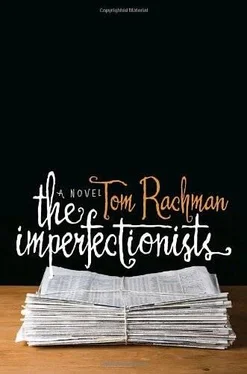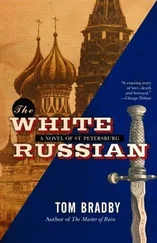He turns it off, tosses aside the remote. He unbuttons her top and pulls it off. He unzips her trousers, tugs them down and off. She's wearing only the funereal black bra and the blue granny panties. She folds her arms to cover her chest and crosses her legs. "Can we turn off a light?"
"Let's leave it on a second," he says.
"But aren't you getting undressed?"
"Hey, don't cover yourself."
"It's kinda bright in here."
"I want to look at you," he says.
"But you're still dressed. And I'm in my, in my, in this bra and these." She laughs uncertainly.
"Wait, wait, hang on. Don't pull up the covers."
"How come? Can't I?"
"One point of order first." His tone changes. His voice goes cold. "One small thing." His eyes track down her body. He proceeds, "Tell me this, Accounts Payable."
She freezes at the name.
"Why," he says, "why of all the people there, Accounts Payable, did you go and get me fired?" He stands at the foot of the bed, staring. "So?" he says. "Explain me that."
2004. OTT GROUP HEADQUARTERS, ATLANTA
Newspapers were spiraling downward.
Competing entertainments abounded, from cellphones to video games, from social-networking sites to online porn. Technology was not merely luring readers; it was changing them. Full printed pages didn't fit onto monitors, so portion size shrank, dicing news into ever-smaller morsels. Instant updates on the Internet bred contempt for day-old headlines in ink. Even the habit of exchanging money for information dwindled-online, payment was merely an option.
As readership plummeted, advertisers fled and losses mounted. But, doggedly, the pay-per-view papers kept at it. They made their daily judgments, produced their digests of the world, laid them out across pages, printed tonight and delivered tomorrow, to be flapped open before bleary breakfast eyes. Fewer eyes, each day.
Despite all this, Boyd was not about to let his father's paper go under. He had rescued it once before, when he'd hired Milton Berber. The trick was to find the right leader. This time, he chose Kathleen Solson, a former protegee of Milton's. Kathleen had risen through the ranks in Rome, then jumped to Milton's old newspaper in Washington, progressing fast. She covered a suburban beat, joined the Pentagon team, became national reporter for the Southwest and then national editor, all in less than a decade.
But at that level in the Washington hierarchy, competition stiffened. To climb the masthead, she'd need to play politics for years. Or she could gamble, jump to the top job at a smaller newspaper, and use it as a proving ground. She flew to Rome to meet with the current crop of senior editors, a sparse breed by then, their numbers diminished by years of attrition.
If she was to take the job, she told Boyd, much would have to change. The paper needed to fill those empty cubicles, buy new computers, bulk up its coverage abroad: a Chinese speaker for Shanghai, an Arabic speaker for the Middle East, and so forth. This was too critical a time in history-the war on terror, the rise of Asia, climate change-to be reporting about the fat folds of celebrities at the beach. "We can leave that to the Internet," she said.
Boyd agreed, and she made the move back to Rome, bringing along her deputy from the Washington national desk, Craig Menzies.
Soon she had cause for concern. The Ott Group-despite Boyd's promises-proved reluctant to fund her plans. She found herself hamstrung by increasingly restrictive budgets and Boyd himself ignored her, leaving everything to underlings-above all to the swinging ax of the paper's chief financial officer, Abbey Pinnola. First, Abbey ordered yet another hiring freeze. Then she abolished merit raises. Then she demanded layoffs.
Kathleen appealed for color pages and for a website, and she hammered on about hiring more correspondents overseas. The Ott board rejected every request. It was only when she sought to contact Boyd through private channels that she learned how ill he was.
It was cancer, the same that had killed Ott. When Boyd heard his diagnosis, he experienced something close to pride: he and his father were allied in this. But as Boyd's symptoms worsened, any such fancy abandoned him. He seethed at those around him, those who would outlive him, who did not deserve to-his grown children, typing asinine messages into mobile phones, idiots who understood nothing. Eventually, even fury failed him, giving way to dark days. His life had been wasted, second-rate beside his father's. No time to fix it.
As chairman, Boyd had transformed the Ott Group. But he had not enriched it. At the time of his death, the company was worth one-third as much as when he had taken it over.
Not one of his four children was an obvious successor. His eldest son, Vaughn, was widely disliked; his two daughters were intelligent but wild; and the youngest boy, Oliver, was so weak-willed as to have recused himself from the Ott board.
That didn't mean Oliver had been left alone. It was he who had cared for Boyd during the illness, and his siblings felt uncomfortably indebted. They intended to discharge their obligation and sought a role for him. The Ott Group holdings were varied enough to offer something. How about this paper they owned in Rome? No one in the new generation could explain why their grandfather had founded this money-losing operation. He must have lost his touch. But now, at least, the paper would come in handy. It would be ideal for Oliver: no pressure, since it could scarcely do worse. Plus, Europe was artsy, which would appeal to him. And he could live in Grandpa's empty old mansion in Rome. Perhaps he would even stun them and turn the paper around.
Oliver himself had no such illusions. He opposed the appointment, reminding his brother and sisters that he knew nothing about business and had scarcely read a newspaper in his life, except to check the arts listings. Vaughn said a business is a business.
"But I don't know anything about any business," Oliver replied.
"You'll learn."
On his arrival, the paper was in an uproar. Kathleen and Abbey leaped at Oliver like polar bears on a walrus-he was an actual, live Ott, and they had him in their midst. Their demands, boiled down, were this: money. Chippy staffers beset him, too, protesting the wage freeze, the threat of layoffs, the filthy carpeting (unwashed since 1977, they said). He rushed off to phone Vaughn.
"Not gonna happen," Vaughn said. "You know how much the paper is losing?"
"Not exactly."
"Well, they're lucky we're still paying their salaries."
Oliver avoided the office after that, dropping by only after hours to sign documents and pick up mail. Otherwise, he hid out at the mansion, his sole daily excursion to walk his basset hound, Schopenhauer.
"GUNMAN KILLS 32 IN CAMPUS RAMPAGE"
PUBLISHER-OLIVER OTT
THE PHONE RINGS IN THE LIVING ROOM. HE KNOWS WHO IT IS, SO he puts on his coat, summons Schopenhauer, and leads the dog outside for a walk.
Oliver is a lanky man, not quite thirty but already hunched, his head dangling forward as if from a coat hook rather than mounted upon a spine. An oily blond fringe curtains his blemished forehead and pale blue eyes, while a turnip nose bobs between strands of hair as he walks. His lips bear nibbled indents, and his chin wavers as he mumbles to his dog. He gazes fixedly down the line of the leash, witnessing the world from Schopenhauer's vantage point-life at sniff level.
A scent catches the basset hound's attention and he jumps toward a urine-drizzled tussock of grass. He pulls this way, wrenches that, braiding Oliver into ever more intricate tangles. "I'm beginning to think," Oliver says, "that the leash is here largely for irony."
Their walks take them all around the city. To the Botanical Gardens on the slopes of the Janiculum. To the Valle dei Cani in Villa Borghese. To the parched turf of the Circus Maximus, where tourists trudge the ancient chariot circuit, chugging bottled water. On the hottest days, Oliver and Schopenhauer cross the Tiber, making for the shaded alleys of Trastevere. Or they stroll up Via Giulia, whose resolutely tall buildings stand up to the sun. Or they saunter through the Protestant Cemetery in Testaccio, where Oliver's grandfather is buried.
Читать дальше












